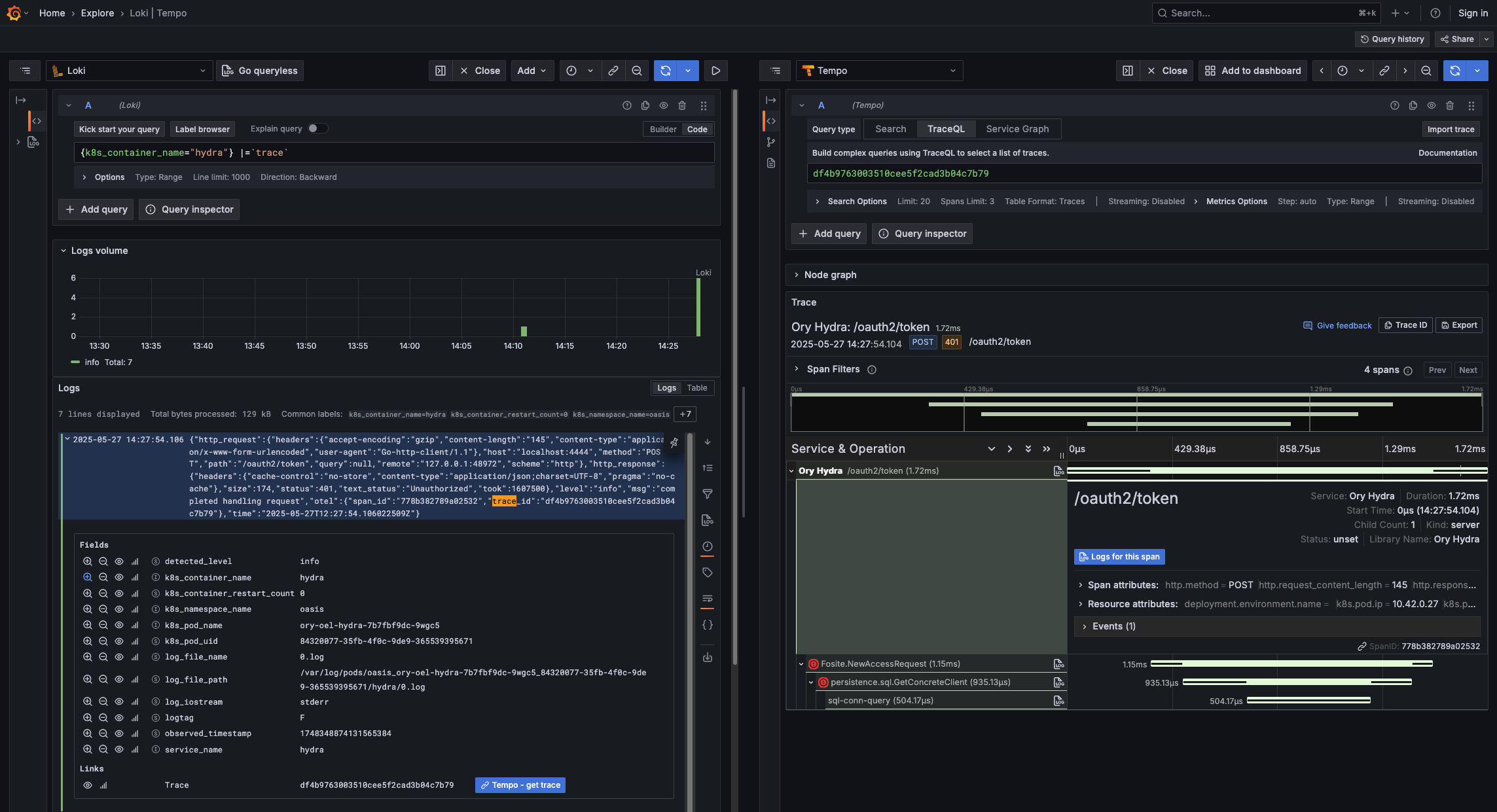Monitoring
This guide presents exemplary monitoring configuration that will work with OEL applications.
Prerequisites
In this document we assume your deployment is installed via Helm charts in a Kubernetes cluster. We present a basic monitoring stack consisting of Grafana, Prometheus, Loki, Tempo and OpenTelemetry Collector.
To get started add following fields in your Helm value overrides:
# use appropriate app name, one of:
[hydra|oathkeeper|kratos|keto]:
config:
tracing:
provider: otel
providers:
otlp:
insecure: true
# go through otelcol for k8s metadata on traces
server_url: opentelemetry-collector.default.svc.cluster.local:4318
serviceMonitor:
enabled: true
You will also need following helm repositories:
helm repo add prometheus-community https://prometheus-community.github.io/helm-charts
helm repo add grafana https://grafana.github.io/helm-charts
helm repo add open-telemetry https://open-telemetry.github.io/opentelemetry-helm-charts
Prometheus & Grafana
Install Helm chart
kube-prometheus-stack (managed by
Prometheus Community).
grafana:
# define datasources
additionalDataSources:
- access: proxy
jsonData:
nodeGraph:
enabled: true
serviceMap:
datasourceUid: demo_prometheus
tracesToLogsV2:
customQuery: true
datasourceUid: demo_loki
filterByTraceID: true
query: "{$${__tags}} |=`$${__span.traceId}`"
spanEndTimeShift: 10m
spanStartTimeShift: "-10m"
tags:
- key: k8s.pod.name
value: k8s_pod_name
name: Tempo
type: tempo
uid: demo_tempo
url: http://tempo.default.svc.cluster.local:3200
- access: proxy
jsonData:
derivedFields:
- datasourceUid: demo_tempo
matcherRegex: '"trace_id":"(\w+?)"'
name: Trace
url: $${__value.raw}
urlDisplayLabel: Tempo - get trace
name: Loki
type: loki
uid: demo_loki
url: http://loki-gateway.default.svc.cluster.local:80
- access: proxy
jsonData:
timeInterval: 30s
name: Prometheus
type: prometheus
uid: demo_prometheus
url: http://kube-prometheus-stack-prometheus.default.svc.cluster.local:9090
grafana.ini:
auth.anonymous:
enabled: true
org_role: Admin
sidecar:
datasources:
# we already created Prometheus datasource with static UID
defaultDatasourceEnabled: false
testFramework:
enabled: false
prometheus:
# Prometheus Operator will ingest all ServiceMonitor objects found on cluster
prometheusSpec:
serviceMonitorSelectorNilUsesHelmValues: false
Please note details in YAML comments.
helm install kube-prometheus-stack prometheus-community/kube-prometheus-stack -f ./monitoring/prometheusValues.yaml
Loki
Our Loki installation needs minimal configuration to run small in this demo.
backend:
replicas: 0
deploymentMode: SingleBinary
loki:
auth_enabled: false
commonConfig:
# cannot be bigger than replica count
replication_factor: 1
storage:
type: filesystem
useTestSchema: true
minio:
enabled: true
read:
replicas: 0
singleBinary:
replicas: 1
test:
enabled: false
write:
replicas: 0
helm install loki grafana/loki -f ./monitoring/lokiValues.yaml
Tempo
Tempo requires no parameters to run as a single pod.
helm install tempo grafana/tempo
OpenTelemetryCollector
---
config:
exporters:
otlphttp/logs:
endpoint: http://loki-gateway.default.svc.cluster.local:80/otlp
tls:
insecure: true
otlphttp/traces:
endpoint: http://tempo.default.svc.cluster.local:4318
tls:
insecure: true
processors:
# enrich traces with Kubernetes metadata
k8sattributes:
extract:
metadata:
- k8s.pod.name
receivers:
# consume Kubernetes node logs
filelog:
include:
- /var/log/pods/*/*/*.log
# needed for container operator
include_file_path: true
operators:
# enrich logs with basic k8s metadata
- type: container
# receive traces over OpenTelemetry HTTP Protocol
otlp:
protocols:
http:
endpoint: 0.0.0.0:4318
service:
pipelines:
logs:
exporters:
- otlphttp/logs
receivers:
- filelog
traces:
exporters:
- otlphttp/traces
processors:
- k8sattributes
receivers:
- otlp
extraVolumeMounts:
# volumeMount to consume node logs
- mountPath: /var/log/pods
name: varlogpods
readOnly: true
extraVolumes:
# volume to consume node logs
- hostPath:
path: /var/log/pods
name: varlogpods
# chart requires this value to be set explicitly
image:
repository: otel/opentelemetry-collector-k8s
# required to collect pod logs from all nodes
mode: daemonset
presets:
# grant ServiceAccount permissions needed to enrich traces with Kubernetes metadata
kubernetesAttributes:
enabled: true
service:
# create service that traces can be sent to; disabled by default in daemonset mode
enabled: true
helm install opentelemetry-collector open-telemetry/opentelemetry-collector -f ./monitoring/otelcolValues.yaml
Access
To access your Grafana instance, forward appropriate port:
kubectl -n default port-forward svc/kube-prometheus-stack-grafana 8080:80
You can now access http://localhost:8080. The metrics include application-specific data on top of data
reported by Kubernetes, and relation between traces and logs has been established (note blue buttons Tempo - get trace and
Logs for this span in screenshot).
